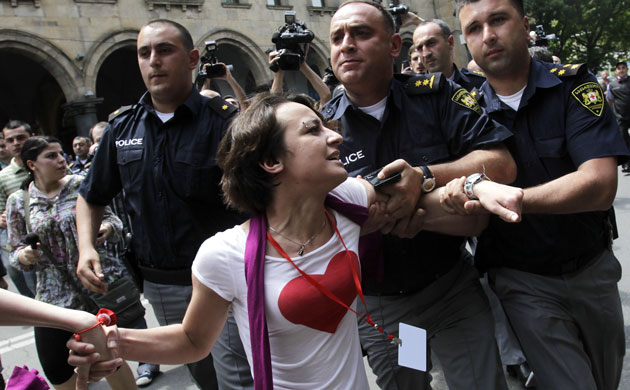
March against homophobia: police failed to protect participants from violent attacks of counter-demonstrators
Identoba and Others v. Georgia – 73235/12
Judgment 12.5.2015 [Section IV]
by Giacomo Romano
The Court held that there had been a violation of Article 3 (prohibition of inhuman or degrading treatment) taken in conjunction with Article 14 (prohibition of discrimination) of the Convention with respect to the 13 applicants who had participated in the march. Firstly, having regard to various reports on the situation of lesbian, gay, bisexual and transgender people in Georgia – in particular, by the Commissioner for Human Rights of the Council of Europe –, it observed that negative attitudes against members of the community were widespread in some parts of Georgian society. Against that background, the discriminatory overtones of the attacks against the participants of the march in May 2012 were particularly clear. The Court further found that, surrounded by an angry mob of people who outnumbered them, uttered serious threats and randomly used physical violence, the applicants must have felt fear, anguish and insecurity which were not compatible with respect for their human dignity. Moreover, the authorities, who knew or ought to have known of the risks surrounding the demonstration, had therefore been under an obligation – but had failed – to provide adequate protection. Lastly, noting that Georgian criminal law provided that discrimination on the grounds of sexual orientation and gender identity should be treated as an aggravating circumstance in the commission of an offence, the Court found that it would have been essential for the authorities to conduct the investigation in that specific context, which they had failed to do. They had accordingly failed to conduct a proper investigation into the 13 applicants’ allegations of ill-treatment.
FACTS
The applicants were a non-governmental organisation set up to promote and protect the rights of LGBT people in Georgia, and 14 individuals. On 17 May 2012 a peaceful demonstration to mark the International Day against Homophobia, organised by the first applicant, took place in Tbilisi and was attended by approximately 30 people, including 13 of the individual applicants. During the event, the LGBT participants in the march were insulted, threatened and assaulted by a larger group of counter-demonstrators who were members of two religious groups. The police eventually arrested four of the applicants and briefly detained and/or drove them around in a police car, with the alleged aim of protecting them from the counter-demonstrators. Following the events, the applicants filed several criminal complaints, requesting in particular that criminal investigations be launched into the attacks against them by the counter-demonstrators which had been perpetrated with discriminatory intent, and into the acts and omissions of the police officers, who had failed to protect them from the assaults. Two investigations into the injuries sustained by two of the applicants were opened in 2012 and remained pending.
LAW
Article 3 read in conjunction with Article 14 (second to fourteenth applicants)
(a) Whether the attack on the applicants reached the minimum threshold of severity under Article 3 taken in conjunction with Article 14 of the Convention: In assessing the incident, the Court bore in mind the precarious situation in which LGBT persons found themselves in the respondent State at the time of the attacks and the various reports documenting negative attitudes against members of the LGBT community prevalent in some parts of Georgian society. Against this background, the Court first noted that during the march the applicants had been surrounded by an angry mob that outnumbered them and which had uttered death threats and randomly resorted to physical violence against them. This behaviour had been motivated by a clear homophobic bias, demonstrated by the particularly insulting and threatening language used by the two religious groups and by the acts of ripping LGBT flags and posters followed by actual physical assaults on some of the applicants. The aim of that verbal and physical abuse had evidently been to frighten the applicants so that they would desist from their public expression of support for the LGBT community. The applicants’ feelings of distress must have been exacerbated by the fact that the police protection which had been promised to them in advance of the march had not been provided in due time or adequately. That violence had thus rendered the fear, anxiety and insecurity experienced by all 13 applicants severe enough to reach the relevant threshold under Article 3 read in conjunction with Article 14 of the Convention.
(b) Whether the authorities provided due protection to the applicants: Since the organiser of the march had specifically warned the police about the likelihood of abuse, the law-enforcement authorities had been under a compelling positive obligation to protect the demonstrators from violence. However, the police officers had been present at the demonstration only in a limited numbers and had distanced themselves without any prior warning from the scene when the verbal attacks started, thus allowing the tension to degenerate into physical violence. By the time they finally decided to step in, the applicants had already been bullied, insulted or assaulted. Furthermore, instead of focusing on restraining the most aggressive counter-demonstrators with the aim of allowing the peaceful procession to proceed, the belated police intervention had shifted onto the arrest and evacuation of some of the applicants, the very victims whom they had been called to protect. Thus, the domestic authorities had failed to provide adequate protection to the applicants from the attacks of private individuals during the march.
(c) Whether an effective investigation was conducted into the incident: The authorities had also fallen short of their procedural obligation to investigate what went wrong during the incident of 17 May 2012, with particular emphasis on unmasking bias as a motive and identifying those responsible. Despite the reiterated complaints filed by the applicants immediately after the incident, concerning both their ill-treatment and the purported inaction of the police, the domestic authorities had failed to launch a comprehensive and meaningful inquiry into the circumstances surrounding the incident with respect to all of the applicants. Instead, they had inexplicably narrowed the scope of the investigation to two separate cases concerning physical injuries inflicted on only two individual applicants and which had resulted merely in administrative sanctions for two counter-demonstrators of a fine of some EUR 45 each. This could not be considered sufficient to discharge the State’s procedural obligation under Article 3 given the level of the violence and aggression against the applicants.
In the circumstances it had been indispensable for the domestic authorities to take all reasonable steps to unmask possible homophobic motives for the events in question. In the absence of such a meaningful investigation by the law-enforcement authorities, prejudice-motivated crimes would unavoidably be treated on an equal footing with ordinary cases without such overtones, and the resultant indifference would be tantamount to official acquiescence or even connivance in hate crimes. Moreover, it would be difficult for the respondent State to implement measures aimed at improving the policing of similar peaceful demonstrations in the future, thus undermining public confidence in the State’s anti-discrimination policy. In the light of these considerations, the domestic authorities had failed to conduct a proper investigation into the thirteen applicants’ allegations of ill-treatment.
Conclusion: violation (six votes to one).
The Court also found, unanimously, a violation of Article 11 read in conjunction with Article 14 in that the respondent State, in breach to its positive obligations, failed to ensure that the march of 17 May 2012 take place peacefully by sufficiently containing homophobic and violent counter-demonstrators.
Article 41: sums ranging from EUR 1,500 to EUR 4,000 in respect of non-pecuniary damage.
SEE ALSO: Nachova and Others v. Bulgaria [GC], 43577/98 and 43579/98, 6 July 2005; Members of the Gldani Congregation of Jehovah’s Witnesses and Others v. Georgia, 71156/01, 3 May 2007; Baczkowski and Others v. Poland, 1543/06, 3 May 2007.
Avv. Giacomo Romano
Latest posts by Avv. Giacomo Romano (see all)
- Trasferimento Medicina per salute, avv. Romano: nuova immatricolazione all’UniME - 17 February 2025
- Ricorso Università Medicina, trasferimento a Napoli per salute: l’avv. Romano vince - 14 December 2024
- Ricorso Università Odontoiatria, trasferimento a Sassari per salute: l’avv. Romano vince - 14 December 2024







